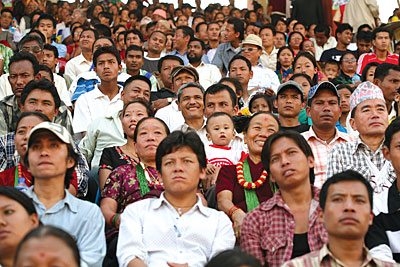 MIN RATNA BAJRACHARYA |
The focus of the nation is on two questions: will the new constitution be written on time and will it be pro-people? Nepal has had six constitutions, all written according to the king's wishes except for the country's First Statute 1947 and the existing Interim Constitution.
Nepal has been declared a democratic republic country. However, it is yet to be seen if this declaration will eliminate ethnic, regional, gender and class discrimination. The identity, access to and representation of the marginalised in the state apparatus are the real issues, and this should be guaranteed in the new constitution.
The real conflict is between the status quoists and progressive forces. The country has already decided to be a secular federal nation. Going back on this will disgrace the people's struggle and their sacrifice. In any case, it's too late for that.
However, it seems a Herculean task to guarantee the rights of Janjatis in the new constitution. With 218 members, Janjatis are well-represented in the CA. Yet it's unclear if this will guarantee marginalised groups better prospects.
The Janjati Caucus works towards unifying Janjati CA members. The Caucus has raised the common issues of Janjatis in draft proposals and even offered suggestions for a scientific demarcation of the proposed 14 ethnicity based provinces. Despite all efforts to bring them together, the Janjati Caucus is characterised by three types of CA members.
First, the status quoists who oppose the idea of the right to self determination, ethnic autonomy and political prerogatives. The number of such Janjati CA members is very small, and they appear in public just to save face.
The second category includes those who are strong in word but weak in deed. They always renege on their commitments come decision time. A huge number of Janjatis fall into this category.
The third category includes those who are genuinely committed to the issues of Janjatis. These activists take up the issues and get them passed in the CA.
Ensuring the rights of Janjatis in the new constitution is the real task of Janjati CA members. Although party whips are not applicable to CA business, CA members feel responsibility towards the party they are affiliated with. At this historic moment, we should forget everything else and work in unison for a common cause. This is a golden opportunity for us, and one which might not come again.
Ethnic provinces, political prerogatives, right to self determination and autonomy are the common demands of Janjatis. We want ethnic provinces, not a province of a particular caste. Brahmin and Chhetris have their identity as well as representation in the state mechanism. We want identity and representation of the marginalised communities. To argue that ethnic, regional and gender equality is anti-democratic is conservative thinking.
There can be competition only among equally competent competitors. It is not undemocratic to give prerogatives to marginalised communities for a certain time. If they were as democratic as they claim, they would have given all an opportunity to flourish. It did not happen as certain communities ruled over other communities.
Natural resources were sold for personal benefit and registered in the name of influential individuals in the past. But when Janjatis claim their rights over natural resources as per ILO convention 169, how is it undemocratic?
We should jointly raise the common issues of Janjatis and get them passed in the CA. If we unite, we can win.
Dura is a Maoist CA member.
READ ALSO:
Constitution 2010, Nepali Times coverage of issues related to writing the new constitution


